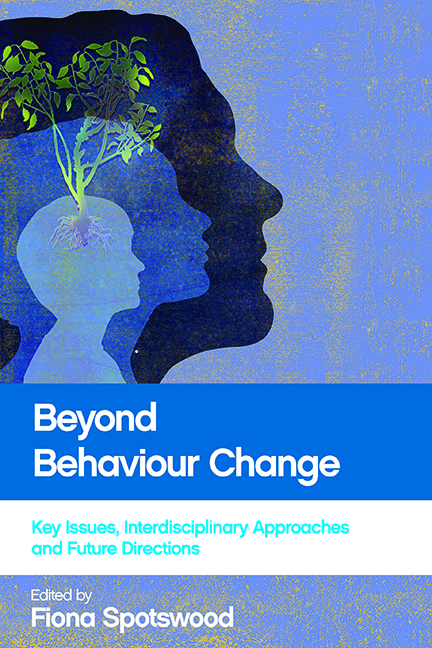twelve - Social practices and behaviour change
Published online by Cambridge University Press: 01 September 2022
Summary
Introduction
Continuing the theme of this second part of the book, which looks at behaviour change through innovative theoretical and ideological lenses, this chapter considers the role that theories of social practice might play in offering new theoretical perspectives to policy engaged with behaviour change, providing fresh insights about the nature of the problems addressed in such policy and novel targets for intervention.
While any domain of activity is in principle amenable to practice theoretical approaches, they have shown particular pertinence to the study of consumption (Warde, 2005) and thus to sustainable consumption (Hargreaves, 2011; Evans et al, 2012; Shove et al, 2012; Warde and Southerton, 2012; Shove and Spurling 2013; Strengers and Maller, 2015; Welch and Warde, 2015) and have been actively adapted to inform policy in this field (Darnton et al, 2011; Darnton and Evans 2013; Spurling et al, 2013; Spurling and McMeekin, 2015). More recently, the pertinence of a practice theoretical approach to transport (Watson, 2012; Spotswood et al, 2015) and health-related policy (Maller, 2015; Blue et al, 2016) has also been advocated and demonstrated.
It is worth stressing that theories of practice, in the plural, are heterogeneous. However, their family resemblance lies in the conception that human activity is primarily the performance of social practices. Practices here refer to everything from domestic practices such as doing the laundry, or everyday practices like driving, to specialist practices (such as work practices), and to cultural practices that help characterise different groups (such as going to the opera). Practices are fundamentally social phenomena: ‘their performance entails the reproduction of cultural meanings, socially learnt skills and common tools, technologies and products’ (Spurling et al, 2013, p 3).
What makes theories of practice distinctive and innovative in the field of ‘behaviour change’, is that the practice itself, rather than the human doing it, becomes the central unit of analysis. So in terms of policy, practice would be the central unit of intervention, rather than individuals (and their attitudes and preferences), or other analytical categories such as norms, values, discourses, or social structures. This perspective reframes the question from ‘How do we change individuals’ behaviours?’ to ‘How do we change practices and their performance?’ Individuals are thus reframed as the practitioners, or carriers, of social practices.
- Type
- Chapter
- Information
- Beyond Behaviour ChangeKey Issues, Interdisciplinary Approaches and Future Directions, pp. 237 - 256Publisher: Bristol University PressPrint publication year: 2016
- 1
- Cited by



